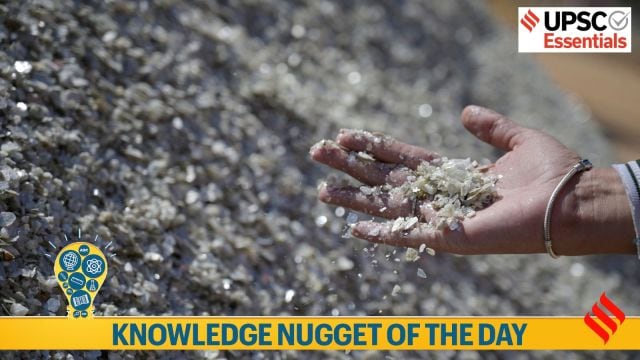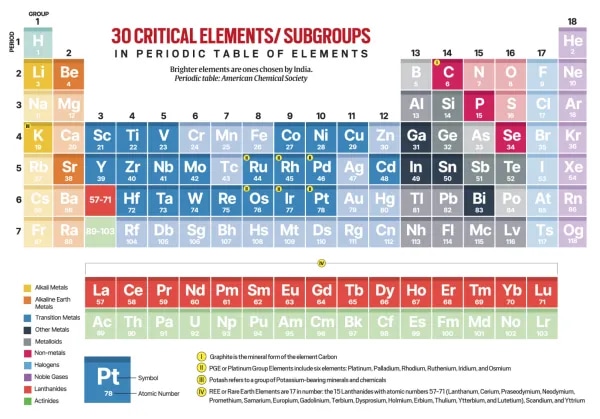Key Takeaways:
1. The mission will intensify the exploration of critical minerals within the country and in its offshore areas. It aims to create a fast-track regulatory approval process for critical mineral mining projects. It aims to encourage Indian public sector enterprises and private sector companies to acquire critical mineral assets abroad and enhance trade with resource-rich countries. It also proposes development of stockpile of critical minerals within the country.
National Critical Minerals Mission aims to reduce import dependence, strengthen domestic value chains and support India’s ‘Net Zero by 2070’ goal.
Prime Minister, Shri Narendra Modi
2. Under the mission, an additional Rs 5,600 crore is allocated to the National Mineral Exploration Trust (NMET) to finance risk coverage for foreign sourcing and to support exploration activities outside India. The mines ministry seeks to amend the Mines and Minerals (Development and Regulation) Act to enable the NMET to fund the proposed activities of the mission.
3. NCMM will receive Rs 1,000 crore from the Anusandhan National Research Foundation (ANRF) and other R&D schemes, and Rs 2,600 crore in budgetary support. The mines ministry had proposed external funding for the NCMM through the World Bank’s Resilient and Inclusive Supply-Chain Enhancement (RISE) initiative.
|
Resilient and Inclusive Supply-Chain Enhancement (RISE) partnership
|
| RISE is a global initiative between the World Bank and Japan to help emerging markets and developing countries increase the manufacturing of clean-energy products and boost their participation in the minerals industry. It was launched in 2023. As of February 2024, only $50 million have been pledged as initial contributions to the RISE initiative, with Japan contributing $25 million and the remaining from other countries, including Canada, Germany, Italy, the Republic of Korea, and the UK. |
4. As part of the mission, the government also plans to create four mineral processing parks and prepare separate guidelines for the recycling of critical minerals, with a focus on streamlining India’s massive informal recycling sector. NCMM also seeks to promote Critical Minerals Partnership Agreements with resource-rich countries and to integrate chapters on critical minerals in existing bilateral trade agreements with countries of interest.
Significance of the Mission
Story continues below this ad
1. The mission aims to strengthen India’s critical minerals value chain by building a technological, regulatory, and financial ecosystem to ensure mineral availability from both domestic and foreign sources. The mission is set to boost access to raw materials used across strategic sectors, from clean energy and electronics to defence and agriculture.
2. According to a report, published by the Institute for Energy Economics and Financial Analysis (IEEFA) in 2024, India’s demand for critical minerals is expected to more than double by 2030, while domestic mining operations may take over a decade to start producing.
3. IEEFA’s report examines five critical minerals (and their compounds) – cobalt, copper, graphite, lithium and nickel – from the perspectives of import dependency, trade dynamics, domestic availability, and global price fluctuations.
4. The findings show that India remains largely import-dependent for these minerals and their compounds, with 100 per cent import reliance for minerals like lithium, cobalt, and nickel.
Story continues below this ad
5. The report said India depends heavily on China for synthetic graphite and natural graphite and it should explore cooperation initiatives with countries like Mozambique, Madagascar, Brazil and Tanzania which are some of the highest graphite producing countries.
6. India is also highly import-dependent for copper cathodes and nickel sulphates from just two countries – Japan and Belgium. The report suggests India could look at the US, the fifth largest producer of copper in the world, to diversify its suppliers and enhance supply security.
7. For minerals like lithium oxide and nickel oxide, the dependency is low on one country, but overall imports largely come from Russia and China, both countries with potential trade risks.
8. India has committed to achieving 500 gigawatts (GW) of non-fossil fuel-based electricity installed capacity by 2030. Currently, the country’s renewable energy installed capacity stands at 201 GW, with solar energy accounting for 91 GW. In this regard, the approval of the NCMM becomes significant.
Story continues below this ad
BEYOND THE NUGGET: Critical Minerals approved by Centre
1. Critical minerals are essential for economic development and national security, and the lack of availability of these minerals or the concentration of extraction or processing in a few geographical locations could potentially lead to “supply chain vulnerabilities and even disruption of supplies”. This is true for minerals such as lithium, graphite, cobalt, titanium, and rare earth elements, which are essential for the advancement of many sectors, including high-tech electronics, telecommunications, transport, and defence.
 30 critical minerals identified by the government
30 critical minerals identified by the government
2. In 2023, the Centre identified 30 critical minerals, including lithium, cobalt, nickel, graphite, tin and copper, which are essential for the country’s economic development and national security.
(Source: Cabinet approves critical minerals mission with Rs 16,300 crore outlay, Centre identifies 30 critical minerals, World Bank, India remains highly dependent on imports of critical minerals, says report)
Subscribe to our UPSC newsletter. Stay updated with the latest UPSC articles by joining our Telegram channel – IndianExpress UPSC Hub, and follow us on Instagram and X.
Story continues below this ad
🚨New Year Special: Click Here to read the January 2025 issue of the UPSC Essentials monthly magazine. Share your views and suggestions in the comment box or at manas.srivastava@indianexpress.com🚨




 30 critical minerals identified by the government
30 critical minerals identified by the government































